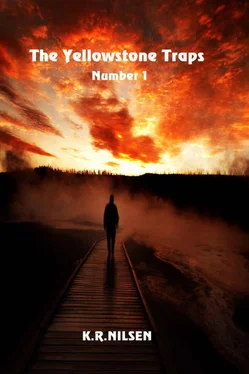Yawning, Winnie raked fingernail nubs through her heavy, wavy hair. It was as dense as wire. The strands were one of the few things in her life she could not control, that and her incessant nail biting. She ran five miles three days a week, rain, snow or zero degrees. A diet of whole grain products, three fruits a day, three vegetables, two raw and one cooked, was mandatory fare. She peeled the skin off her chicken, kept a juicer on the counter, took a host of herbal supplements, drank copious amounts of water to flush toxins from her body and had one glass of red wine each evening for her heart. The cognac was a token but oh-so-necessary treat.
As a student at the University of Missouri at Columbia, she had studied political science and became enthralled with the nature of radical politics—terrorist activity, western survivalist groups, separatist movements, white supremacists, ultra-orthodox religious sects and spiritual cults. For her graduate work, she designed computer file-sharing programs for state investigative agencies and wrote worm software for infiltrating targeted hard drives. She was poised to enter federal investigative service but chose the heftier salaries from the private sector instead. Her uncanny aptitude for extracting precious nuggets of information from computer databases helped her pay down a heavy burden of college loan debt.
When Abel Whittemore began to rise from below the mass-culture radar, once his books reached the upper brackets of nonfiction best-seller lists, Winnie devised an assignment to infiltrate his life and study the evolution of the radical movement he was nurturing. She managed to convince her superiors into giving her the green light to pursue Whittemore directly in his lair.
As she combed through Whittemore’s many written works and downloaded background material on him, she became enthralled with his profile. The man, she discovered, was promoting an atypical brand of survivalism, antigovernment sentiment and anti-consumerism. Unlike survivalist groups under federal watch in Montana, Michigan, Texas and elsewhere, Whittemore’s brand of defiance shunned violence. While survivalists in the West were virtually all heavily armed and spewed anti-federal government rhetoric onto the airwaves, Whittemore’s Independency movement was a complete departure from that model. The man was a student of the towering figures of nonviolent resistance: Jesus, Buddha, Gandhi, Dr. Martin Luther King and the anti-apartheid revolutionary, Nelson Mandela, from South Africa.
Whittemore’s popular appeal, Winnie hypothesized, came from his post-New Age units of small, exceptionally self-sufficient and highly productive technical-agrarian hybrid communities, where citizens shared equally in the bounty of a micro-society’s work. The central tenet his readers gravitated to, she determined, was his declaration that average citizens, following his example, could create alternative and sustainable communities that were fortresses against gluttonous consumerism, predatory capitalism, pop-culture crassness, and other mass-culture ills.
America, he declared, had become a continent of isolated, completely dependent and ultimately desperate consumers living in quiet but very real terror of losing a job or health care or shouldering great debt. That simple mantra seemed to resonate with citizens from many walks of life. It was as if some fraction of the middle class was seeking a panacea in Whittemore’s message. He had his own brand of snake oil for them.
Sitting in her cozy Florida room, Winnie nursed the Courvoisier. She was enthralled with the central character of her report. Unlike survivalists, who simply stockpiled food and weapons in cabins in remote areas, the author of Independency had created a full-fledged counter-society, a new small town on a 400-acre chunk of isolated Minnesota bluff country.
The experiment was, by many accounts, successful. A dozen other communities based on Whittemore’s work had already sprung up across the nation and more were planned. Powered by his best-selling books, Abel was injecting doses of his philosophy into the veins of mainstream culture.
Winnie perused satellite images of Whittemore’s new hamlet. One close-up photo of the compound revealed five or six-dozen structures, mushrooming into existence in just ten years after the very first buildings went up. The most striking feature about the compound was a large cluster of glass-glazed buildings all facing south. These were great banks of greenhouses, Winnie decided.
Also in the image were several community buildings whose function she did not know for certain. Based on Whittemore’s writing, she thought they were likely a community center, studios for the arts, some sort of commerce building, a school/training facility and a clinic. Small homes ringed a New England-style town square while others were clustered close by in the nearby woodlands.
All this was well and good, thought Winnie. She had information and photography, but she did not have Abel Whittemore in the flesh. The utopian was an emerging public figure because of his best-selling books and popular lecture series. He spent considerable time on the road promoting his vision of the future and assisting other emerging Independency-like self-sufficient communities. Now it was time to meet the man, Whittemore, to go to him and observe him in his lair.
Winnie planned to enter and circulate inside Independency village simply by enrolling in sequential sessions at the community’s Institute for Total Life Skills. There she could see for herself what this man had built with a band of modern-day pioneers and could uncover a great deal more about the future intentions of this post-New Age pitchman.
Winnie felt smug, excited by the prospect.
At first light, Liz sprinted to the lake beach south of Plover Point to check on the Park Service boat she had piloted the day before and several marine sediment probes she had brought with her from the East and stowed aboard the craft. She had pulled the boat out of the water onto a ribbon of sand and rock. As she approached the lake waters, she sensed the narrow, rough shoreline beach was wider, much more expansive than when she had come ashore. The scientist studied the terrain for some minutes. There could be but a single explanation for what she was seeing: Plover Point, jutting out from Flat Mountain Arm into the lake like the beak of a bird, had thrust upward during the earthquake, had lurched a foot or two higher than when she first made landfall. After the rogue seiche wave subsided, the lake’s waters retreated to the east and southeast, leaving the beach wider and stretches of lake bottom exposed.
The boat, its low-horsepower outboard motor still attached, lay at the base of the shoreline trees. It had been hurled off the beach by the wave and hammered against the forest ramparts. Liz thought it seaworthy, but there was no sign of the probe equipment. She’d have to wait for a shipment of custom-built probes to arrive from MIT to commence her subsurface research.
The narrow foot trail back to the South Arm cabin bore her quietly along. She was eager to unpack her notes, data CDs and other things and boot up the research station’s solar-powered systems, provided they had survived the quake. The geophysicist felt energized despite the frightening late-night tremor and the loss of the equipment. Now she could dig into the latest seismic data, find out something about the night tremor and begin to monitor Yellowstone Lake’s vital signs.
Approaching the small clearing where the research cabin stood, Liz spotted a pile of material in the trail. It was full of grass fiber and rodent fur—scat, a great mass of it, fresh and still steaming with the internal heat of its owner. Grizzly excrement. Indistinct marks of the animal’s feet and claws were imprinted into the sopping soils and slipped away toward the little building just visible through the trees.
Читать дальше










